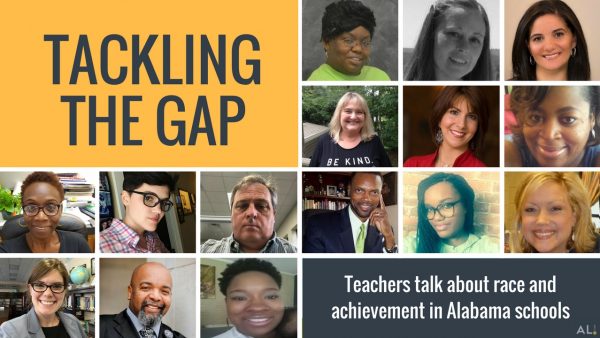Series Takes On Alabama’s Racial Achievement Gap
African-American students in Alabama tend not to perform as well on standardized tests as their white counterparts. That’s part of the so-called “achievement gap,” one of the most persistent and touchiest issues in education. But a new data-driven series by Al.com, journalism nonprofits Spaceship Media and Solutions Journalism Network, and teachers from across Alabama aims to address those disparities. Lead reporter Trisha Powell Crain of Al.com talks with WBHM’s Dan Carsen about the gap, and what teachers are trying to do about it.
The Gap They’re Fighting
“There’s always been this 20- to 30-percentage-point gap between black students and white students. And there are a lot of factors. … First you look at poverty — their parents may not have the resources to give them extra opportunities, to have books at home, to transport kids to after-school activities. But there are also school-based factors. We know that black kids and Hispanic kids are less likely to be identified as gifted. Why is that? It’s not the ‘raw material’ — that’s just not the case.”
One Factor
“In places where there is segregation, high [degrees of residential] segregation — all you have to do is look at Jefferson County and you see Vestavia and Homewood — there are often large achievement gaps. I mean they can almost predict where those achievement gaps are going to be. You have to identify the problem before you can address it.”
It’s Not Simple, Not the Kid
“I think that a large portion of the public thinks they have it figured out. They think they know why there is a racial achievement gap, and it boils down to, ‘oh, it’s just the kid,’ which, research shows, it’s not the kid. But when people already think they know the answer, it’s kind of hard to present to readers that, no, it’s actually this, plus this, plus this, plus this, plus this. And the ones who want to simplify it, I think it’s a way of pushing it off to the side and saying ‘that’s not my problem.'”
Solutions?
“We’re starting to look at being very conscious about who you are identifying for [disciplining and] for gifted opportunities, being very conscious about supporting children, taking them where they are, and being deliberate in who you offer resources to. I mean, when you think about it, there’s one teacher in front of 20 kids, sometimes 30 kids, sometimes 35. So a teacher has to figure out, ‘how am I going to divide up my time? Who am I going to help? Who am I going to pay attention to?’ [Also,] are there wraparound services?’ We know in community schools where there are wraparound services available to help kids with all of that stuff outside of the school day, the children learn better. We aren’t doing that much in Alabama.”
Trump says he is ‘not happy’ with the Iran nuclear talks but indicates he’ll give them more time
U.S. President Donald Trump said Friday he's "not happy" with the latest talks over Iran's nuclear program but indicated he would give negotiators more time to reach a deal to avert another war in the Middle East.
Bill Clinton says he ‘did nothing wrong’ with Epstein as he faced grilling over their relationship
Former President Bill Clinton told members of Congress on Friday that he "did nothing wrong" in his relationship with Jeffrey Epstein and saw no signs of Epstein's sexual abuse as he faced hours of grilling from lawmakers over his connections to the disgraced financier from more than two decades ago.
Pentagon puts Scouts ‘on notice’ over DEI and girl-centered policies
After threatening to sever ties with the organization formerly known as the Boy Scouts, Defense Secretary Hegseth announced a 6-month reprieve
President Trump bans Anthropic from use in government systems
Trump called the AI lab a "RADICAL LEFT, WOKE COMPANY" in a social media post. The Pentagon also ordered all military contractors to stop doing business with Anthropic.
HUD proposes time limits and work requirements for rental aid
The rule would allow housing agencies and landlords to impose such requirements "to encourage self-sufficiency." Critics say most who can work already do, but their wages are low.
Paramount and Warner Bros’ deal is about merging studios, and a whole lot more
The nearly $111 billion marriage would unite Paramount and Warner film studios, streamers and television properties — including CNN — under the control of the wealthy Ellison family.







